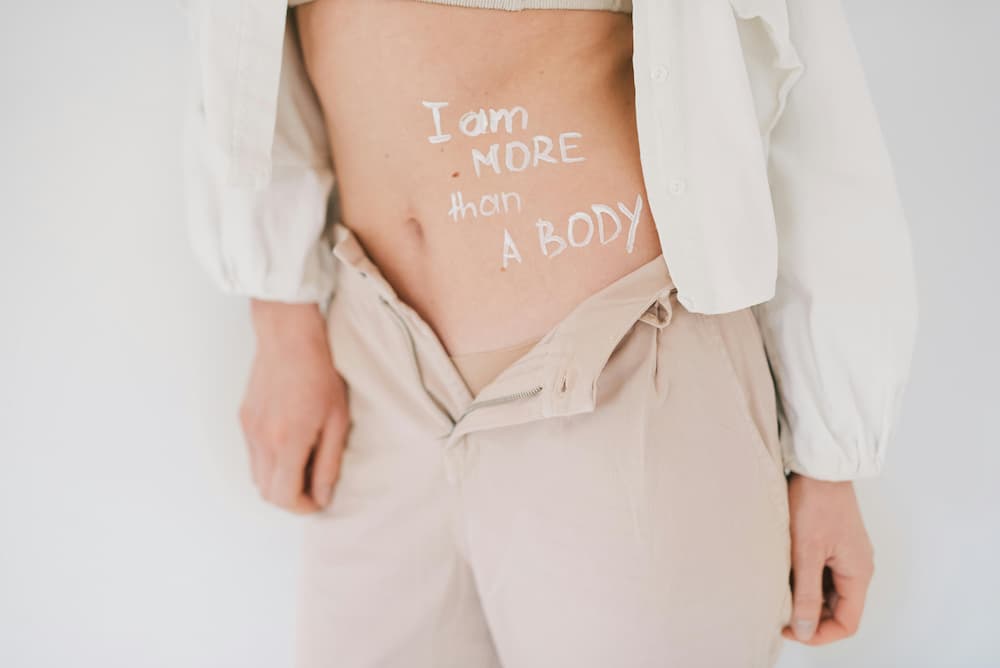The summer season magnifies everything our culture teaches women about how our bodies should look. Warm weather means fewer layers, which often means more exposure—not just to the sun, but to scrutiny, comparison, and shame. We’re surrounded by messaging that tells us it’s normal to feel unworthy unless we’ve achieved a certain kind of thinness, toned stomach, or effortless glow.
If you’re feeling a sense of dread about being seen, your discomfort is not a personal failing. It’s the product of a system designed to keep women focused on fixing themselves instead of fully living their lives.
How Feminist Therapists Address Summer Body Pressures
Feminist therapy takes a broader lens to issues like body image. Instead of asking “Why do I feel this way?” feminist therapists also asks, “Who benefits from me feeling this way?”
We recognize that the shame we carry about our appearance is not innate—it’s taught. And it’s reinforced by billion-dollar industries that thrive on our dissatisfaction. Beauty culture tells us we must shave, wax, tone, tan, and diet in order to be acceptable. We’re sold an image of “health” that’s really about aesthetics and perfectionism, not well-being.
From a feminist therapy perspective, the problem isn’t your body. It’s the pressure to make your body into something it was never meant to be: an object for consumption, rather than a home for your life.
Begin Feminist TherapyThe Myth of the “Summer Body”
The term “summer body” is a made-up marketing concept. It implies that only certain kinds of bodies are allowed to be visible during summer months. It suggests that women’s bodies are seasonal projects—something to be sculpted, shaved, and punished into submission before we “earn” the right to wear a swimsuit or shorts.
Living in this mindset is exhausting and limiting. It distracts us from our values, our relationships, our sense of self. It keeps us living small, anxiously scanning ourselves and others, always trying to measure up, and avoiding activities we might otherwise enjoy, like swimming or enjoying the food at a summer party.
Internalized Objectification and Its Impact
We don’t just experience objectification from the outside. Many of us have internalized the cultural messaging so much that we monitor how we look instead of fully inhabiting how we feel. This is called internalized objectification, and it’s one of the most insidious effects of growing up in a culture that prizes appearance over authenticity.
When we internalize objectification, we see ourselves as an image to be evaluated, rather than a person with agency and worth. We may stop engaging in things we love—swimming, hiking, dancing, even intimacy—because we’re too self-conscious about how we might appear. We disconnect from our bodies in order to control them. We dissociate from our joy in the name of control.
Feminist therapy works to interrupt this cycle by helping you reconnect with your body not as a problem to be solved, but as an ally to be listened to. It teaches you how to reclaim your body from the culture that taught you to hate it.

Shifting the Focus from Appearance to Experience
One powerful shift you can make this summer is to start asking yourself: “What do I want to experience in my body today?” instead of “How do I look today?”
This might sound small, but it’s actually radical. It invites you to tune into sensations, desires, and needs, rather than external evaluations. Do you want to feel the sun on your shoulders? Move freely in clothes that breathe? Swim without tugging at your suit the whole time? Laugh with friends at the beach without hiding behind a towel?
When we prioritize experience over image, we start to return to ourselves. We stop sitting on the sidelines of our lives waiting to feel “ready” to participate.
Naming the Standards for What They Are: Oppressive and Unrealistic
It’s also important to name the beauty standards for what they are: oppressive and, for most people, unattainable. They’re rooted in whiteness, thinness, youth, and ableism. They pathologize aging, body hair, cellulite, fat, and any kind of visible difference. They’re designed to create insecurity because insecurity drives consumerism. If we all woke up tomorrow feeling at peace with our bodies, entire industries would collapse.
Naming these systems doesn’t magically make body image struggles disappear, but it gives us context. It takes the blame off of us and puts it where it belongs—on a culture that profits off of our pain.
Ways to Feel More Empowered in Your Skin This Summer
If you’re looking for ways to feel more grounded and connected in your body this summer, here are a few ideas grounded in feminist therapy principles:
- Limit body checking. Avoid mirrors and photos that trigger self-criticism. Try tuning into how your body feels rather than how it looks.
- Wear what’s comfortable. Choose clothing that allows you to move and breathe easily. You don’t owe anyone a certain look or silhouette.
- Curate your media. Unfollow accounts that make you feel bad about your body. Fill your feed with diverse bodies, aging bodies, joyful bodies.
- Practice embodiment. Do things that help you feel in your body: dancing, stretching, swimming, walking barefoot, breathing deeply.
- Set boundaries around conversations. If friends or family are talking about dieting or weight loss, it’s okay to leave the conversation, change the subject, or say, “I’m working on having a better relationship with my body and I’d rather not talk about this.”
- Focus on what your body does, not just how it looks. Your body allows you to show up to your life. That matters more than anyone’s opinion about your size or shape.
- Remember that you are more than a body. You are a whole person who loves, thinks deeply, laughs and gives back to the world. Reducing yourself to a body—which will decay and change—minimizes the complex and beautiful truth of who you are. Think about what you love about the women in your life. Do you love their ability to hold space, listen and laugh with you…or do you love their six pack?
Why This Work Matters
Remember that you don’t struggle with body image because you are vain, and healing allows you to reclaim power, safety, self-worth, and to start to take up space in the world.
When we reject oppressive standards and come home to our bodies, we’re doing more than improving our self-esteem—we’re resisting a culture that wants us distracted, ashamed, and small.
Feminist therapy helps you unlearn the lies you’ve been told about your body and gives you the tools to build a relationship with yourself based on care, autonomy, and compassion. It helps you move from self-surveillance to self-trust. From shrinking yourself to fully showing up.

You Deserve to Take Up Space
This summer, you don’t have to earn the right to show up in your body. You already belong in the sunlight, the water, the world. You don’t have to change yourself to be seen. You don’t have to perform wellness to be worthy. You get to take up space—not just physically, but emotionally and spiritually too.
If You’re Ready to Work on This
If you’re tired of the mental load that body shame brings—especially during the summer—and you want to explore a different way of being in relationship with yourself, feminist therapy might be a powerful path for you.
I offer feminist therapy that’s warm, nonjudgmental, and grounded in helping you develop a better relationship with yourself. Together, we can unpack the cultural stories that have shaped your relationship with your body and heal the wounds that have kept you feeling disconnected from yourself.
Get In Touch
Emma Kobil is a trauma therapist practicing online with feminist women and thoughtful couples in Colorado and Florida. Her philosophically informed therapeutic approach focuses on helping creative and perfectionist women and couples heal. Learn more about Emma, or schedule an appointment, at mindfulcounselingdenver.com.









